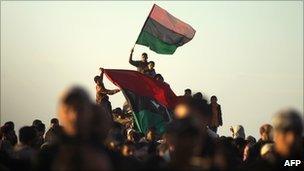Gaddafi family asset probe has only just begun
- Published

Libya's Muammar Gaddafi said the freezing of assets was an act of "piracy"
The UK's decision to freeze assets owned by Libya's Muammar Gaddafi and his family is only just the start of the process.
Now the authorities have to identify exactly what those assets are, and how much they are worth.
The announcement on Sunday by George Osborne, the Chancellor, to block the assets of the Gaddafi family and about 20 of their inner circle follows a European Union decision to impose sanctions.
This decision for a Europe-wide crackdown came, in turn, after a vote at the United Nations that countries worldwide should start choking off the family's funds by preventing money from being moved or assets sold.
Some countries - particularly the United States - have been more proactive about freezing assets than others. But slowly the noose is tightening.
On Wednesday, Spain froze a 2,000-property tourism development near Marbella said to be linked to the Libyan leader. Such assets will remain in limbo until they can be handed back to a new government or legitimate authority.
But, as Pepe Egger, of consultancy Exclusive Analysis, points out, it will not necessarily be clear which assets belong to the Gaddafis' personally, and which belong to the Libyan nation.
The UK Treasury has reportedly identified about £1bn ($1.6bn) worth of assets in Britain owned by the Gaddafi family.
But there are other assets in Britain owned by the Libyan Investment Authority (LIA), a fund set up in 2006 to invest the country's vast oil wealth.
Crumbling
And the LIA, estimated to have up to £80bn invested worldwide, does not yet appear to be part of the Treasury's freezing order.
"Until very recently, it was very clear who was in charge of the [LIA's] money," said Mr Egger. "Libya was Gaddafi and Gaddafi was Libya."
But with the government's authority crumbling, this is now not so clear.
Freezing LIA assets could damage the companies in which the fund has investments, and deprive Libya of legitimate revenues.
But the complexity of the situation was highlighted this week by Pearson, owner of the Financial Times newspaper.
The LIA owns a 3.27% stake in Pearson and is the company's fifth largest shareholder.
Yet, Pearson said in a statement on Tuesday that it had "informed the LIA and its nominees that Pearson will not register any transfer or pay any dividend in respect of the shares until further notice".
"The LIA is a Libyan state asset, and it is to be hoped that in due course these assets can be redeployed to the benefit of Libya and its people," the statement said.
Pressure
The United States has not excluded the LIA from its asset freeze, and Mr Egger believes it won't be long before the UK and other European governments do the same.
"Maintaining the distinction between the LIA and the Gaddafi family is going to be difficult," he said.
The Treasury is now working to decipher which assets are for personal benefit and which are needed to generate revenues for the Libyan people and infrastructure.
The UK's financial and legal community has been instructed by the Treasury to help with this process.
According to one source, names of people, assets and companies will have been distributed to all banks with UK operations. It is incumbent on the major law firms to monitor the situation as well.
"There will be a process of cross-checking and due diligence," the BBC was told. "It's quite probable that the banks kept their own lists and information, anyway. But they will now be required to open up their files and tell the authorities of anything suspicious."
Any bank found to have missed information on Gaddafi assets or to have not kept the required paperwork would face big fines, so the pressure is on to uncover information for the Treasury.
'On standby'
The fact that this asset discovery process is being led by the Treasury, rather than the Home or Foreign Offices, suggests that the UK's crime authorities are not yet involved.
The Serious Organised Crime Agency (Soca) led searches for assets connected to former Egyptian president Hosni Mubarak after a formal request for information from the new military government.
This request went to the Home Office via the Foreign Office, and similar protocol would be followed if another government asked the UK criminal authorities to investigate.
Any other international crime authority would also direct its requests to the Home Office. A source told the BBC that Soca was on "standby but not yet active" regarding Gaddafi assets.